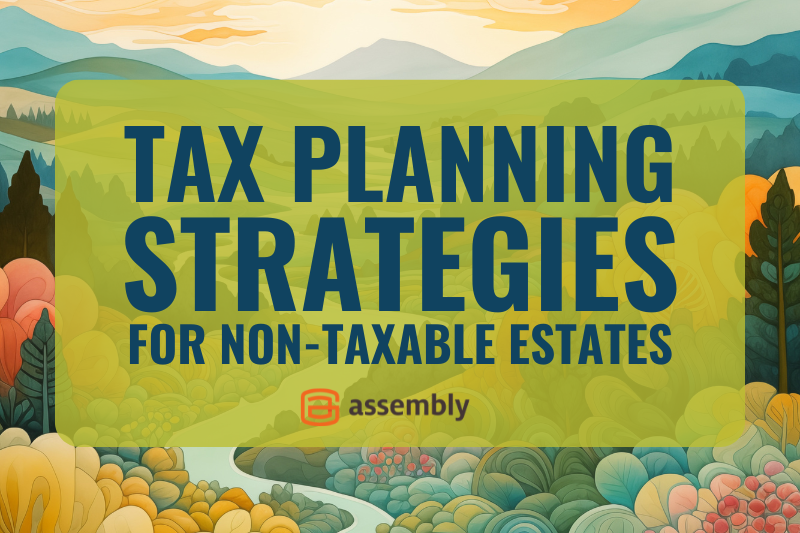Tax Planning Strategies for Non-Taxable Estates
Through the end of 2025, only estates worth more than $13.61 million are subject to federal estate tax. Under the current law, only a tiny percentage...

To ensure your assets are distributed in accordance with your wishes, detailed financial planning is essential. Without a legal will, up-to-date beneficiaries on retirement accounts and a trust (if applicable) probate courts could determine how your assets are distributed. Probate can be time-consuming, expensive and tax inefficient.
Beneficiaries should also be aware of potential tax ramifications of their inheritance and plan accordingly. In this article, we’ll explain how to create a solid, tax-efficient inheritance plan and share a cautionary tale.
The central estate planning document is a last will and testament (a “will”), a legal document that states how your assets should be distributed when you die. Without a will, your estate goes into probate, which can be complex, time-consuming, and expensive.
Effective estate planning is an ongoing process that involves more than just having a will in place. Ensure beneficiaries are kept up-to-date on:
A Cautionary Tale...
In a recent court case, a Federal Court in Pennsylvania ruled that an ex-girlfriend was legally entitled to the balance of the retirement account of her deceased ex-boyfriend even though the couple broke up in 1989! Why? Simply because she was the listed beneficiary. Her ex-boyfriend never changed the beneficiary on his retirement account despite many opportunities to do so between their breakup in 1989 and his death in 2015.
It’s also a good idea to have secondary or contingent beneficiaries in place for these types of accounts. The contingent beneficiary will receive the assets if the primary beneficiary has passed away or disclaims the inheritance.
In many scenarios, it makes sense to own your home in the name of a trust in order to bypass the probate process for your home when you pass away. If you own homes in multiple states, putting both properties in a trust will help avoid a multi-state probate process. Potentially going through the probate process in two (or more) states will add an additional layer of complexity to an already complex and time-consuming probate process.
In some situations, it might make sense to have non-retirement investment assets held in a trust. Consult with an experienced financial advisor to determine the best needs for your individual situation.
Let’s say you bought shares in Apple, Inc. stock in the 1980s, and you would like to give some of these shares to your children. Because of the stock’s appreciation, there may be a tax advantage to including these shares with your estate rather than giving them as a gift while you are still alive.
Inherited assets in a taxable brokerage account or a trust receive a step-up in basis upon the death of the parent. The children now each have a new cost basis of the shares of stock – the fair market value of the stock on the date when the parent passed away. If these shares were given as a gift to the children, they would not receive the step-up in basis and the children could be on the hook for significantly higher capital gains taxes when they are ready to sell the stock.
It might make sense to give other assets, such as cash, as gifts. Currently, you can gift any individual up to $18,000 ($36,000 for spouses) per year without incurring any taxes. The recipient does not have to fill out any tax forms so long as the value of the gift is under the $18,000 ($36,000 if coming from a couple) threshold.
Work with a financial advisor to determine which assets to give as gifts and which to leave in your estate.
Perhaps the most important part of planning for an inheritance is understanding the tax consequences (if any) of the inheritance — immediately and in the future.
The federal estate tax applies to estates that are worth more than $13.61 million (as of 2024). Note that this amount is scheduled to be reduced to an estimated $7 million at the end of 2025, barring any changes to the law between now and then.
Some states have estate taxes that are separate from the federal estate tax. In addition, some states impose a separate inheritance tax on the recipients of an inheritance. Work with a financial advisor and a tax advisor to understand if any estate and/or inheritance taxes apply to your situation.
If an inherited Individual Retirement Account (IRA) or 401(k) comes from someone other than a spouse, then the account must be drawn down and emptied out within 10 years, in most cases. Withdrawals are taxed as ordinary income and could push you into a higher tax bracket.
A financial advisor can help you establish a plan to make those taxable withdrawals in the most tax-efficient way possible. For example, you could plan to take a larger withdrawal from the inherited retirement account in a year where your taxable income is expected to be lower than normal.
Coming into a significant amount of money is an important life event that should trigger a review of your financial plan and an assessment of how this inheritance impacts your plan going forward. If you do not yet have a financial plan, this would be a good opportunity to partner with an experienced wealth manager and build a long-term financial plan based on your financial goals and risk tolerance.
Generally speaking, it makes sense to first pay off any high-interest debt, such as credit card debt, and create an emergency fund (if you haven’t already) that will cover several months of living expenses in the event of a job loss or other unexpected financial challenge.
From there, inheritance money can be used to:
Preparing for a death in the family is never easy. But a detailed, tax-efficient estate plan provides invaluable peace of mind for all parties involved.
Related Reading:
Disclaimer: Assembly Wealth is neither an attorney nor accountant, and no portion of this content should be interpreted as legal, accounting or tax advice. Individuals should consult with an investment professional, or an attorney or tax professional regarding their specific investment, legal or tax situation.
Assembly Wealth (“Assembly”) is an SEC registered investment adviser; however, this does not imply any level of skill or training and no inference of such should be made. The opinions expressed herein are as of the date of publication and are provided for informational purposes only. Content will not be updated after publication and should not be considered current after the publication date. We provide historical content for transparency purposes only. All opinions are subject to change without notice and due to changes in the market or economic conditions may not necessarily come to pass. Mention of a security should not be considered a recommendation or solicitation to purchase or sell the security, and any securities mentioned may be held by Assembly for client portfolios.
Information presented represents an opinion as of the date published and should not be considered an investment recommendation. Assembly does not become a fiduciary to any listener, reader or other person or entity by the person’s use of or access to the material. The reader assumes the responsibility of evaluating the merits and risks associated with the use of any information or other content and for any decisions based on such content.
Fill out the form to be notified about new articles.

Through the end of 2025, only estates worth more than $13.61 million are subject to federal estate tax. Under the current law, only a tiny percentage...

When you leave a job — to retire, pursue other opportunities, or due to termination — you’ll have the option to cash out your 401(k). Receiving a big...

Many Americans don’t have an estate plan because they don't like to think about a time when they will no longer be around. It's understandable, but...